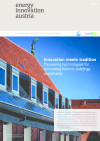Suchergebnisse für "Factsheet: Energietechnologien gestalten, die für alle sinnvoll und nutzbar sind"
openBAM - Open Building Automation Modelling - Open modeling of building automation over the entire building life cycle
Platform-independent modeling of control and regulation logic for detailed study of building automation systems involving construction and building technology. The result enables the analysis of energy saving potentials through building automation before construction.
Workshop: Althaussanierung mit Passivhauspraxis
3. Nov 2003
Landhaus, OstarrichisaalSt. Pölten, AT
Veranstaltung zum Projektabschluss des Haus der Zukunft-Projekts
Tagung: 5. Nationale Photovoltaik-Tagung
25. Mar 2004 -
26. Mar 2004
ETH ZürichZürich, CH
Integration Solarstrom - Architektur
Innovation meets tradition

Pioneering technologies for renovating historic buildings sustainably
energy innovation austria
1/2014
Herausgeber: BMVIT und Klima- und Energiefonds
Englisch, 8 Seiten
Downloads zur Publikation
Sustainable ventilation systems in multi story residential buildings in the conflict areas of hygiene and costs
The goal of this project was to develop guidelines for hygienic and cost-efficient mechanical ventilation systems in residential buildings, in which maintenance and cleaning demands are described. These guidelines are based on existing literature as well as practical experience of the property owners, finally they are based on results of hygienic measurements in existing ventilation systems conducted in this research project.
win wi[e]n: block development ground floor zone: Optimization of the Viennese block renewal programm as a tool for a sustainable development of street level and open (public) spaces of urban fabric
Development of the Viennese Block Renewal Program with a special focus on the ground floor zone of historical urban fabric (on the basis of the case study Block Renewal Area Ilgplatz, Vienna): sustainable restructuring and reusing of the blocks at ground level, including courtyards and street spaces- as a comprehensive planning approach.
Building of Tomorrow for the construction industry
Dissemination of results of the research initiative "Building of tomorrow" for two specific target groups - master builder and installer - implementation in further vocational training concepts
New4Old - New energies for old buildings
The project "New4Old - New energy for old buildings - Promoting the integration of RES & RUE measures in historic buildings" aims to promote the integration of renewable energy and energy efficiency technologies into historic buildings, and to create a European-wide network of Renewable Energy Houses in the different Member States of the European Union.
Practice Guide for Sustainable Building Sanitation and Modernisation within Construction Intents

A checklist considering priority, construction progress and actors is elaborated to serve a future-oriented selection of materials, energy carriers, design and construction within building sanitation, under a deliberate consideration of the involved actors from the construction branch
Oekosan'11 - International symposium for high-quality retrofit of large-volume buildings to plus-energy-buildings
The AEE INTEC organized the international congress "ökosan'11 - high-quality retrofit of large-volume buildings to plus-energy-buildings" in September 2011. The position of Austrian companies in international cooperation was strengthened through personal contacts during the conference.
EnergyCityConcepts - Methods and concepts for the implementation of sustainable energy systems in cities
Two concrete model regions (small city Gleisdorf and urban city quarter Salzburg-Schallmoos) will be developed and tested using new methodical approaches (interdisciplinary urban and regional energy planning, modeling and simulation). Therefore, it is aimed to substantiate scenarios and concepts for the implementation of defined targets on technical, ecological and economic criteria.
GreenDeal4Real - Improving the thermal comfort in mixed-use areas through cost-effective green infrastructure
The aim of the project is to avoid overheating in summer by using innovative greening measures in the mixed residential and commercial area Aspernstraße/Lavaterstraße. The development of a guideline should facilitate the realisation of climate-sensitive projects from strategy to actual implementation and ensure a high degree of transferability to other areas.
SmartCity Baumgarten - Demonstration of an anergy network and implementation of climate-friendly solutions in existing districts
Implementation of a cross-property anergy network for the supply of heating, cooling and electricity in an existing neighbourhood. With this demonstration project, a technical-legal alternative for areas outside of district heating supply is developed, which makes it possible for neighbourhoods to join together to use renewable energies in common.
GREENsChOOLENERGY - Development and practical implementation of sustainable solutions for urban hotspots in combination with greening / PV / water
Use of the synergetic effects in the construction of photovoltaic, greening and irrigation systems at the location of HTL1 Klagenfurt Lastenstraße, to optimize the yield of experimental photovoltaic elements and at the same time reduce urban heat islands.
Indicators for urban areas – for construction, operation and mobility in climate-friendly areas
Development and coordination of indicators for energy and ecological evaluations of urban areas based on the Swiss 2000-Watt certification system. The results will be used for the development of a quality assurance system for urban areas similar to the klimaaktiv declaration for buildings and the e5 certification for communities.
Intelligent and green? User centred scenarios for information technology use in sustainable buildings

The project asked for the contribution of information technology use to the environmental performance of buildings - in terms of the vision of designers, practical use in existing projects and expectations of potential users.
Living and Working in the Moosburg, the "community of education"
The design aims not only at creating comfortable living spaces and practical work environments, but at connecting these realms, thus providing a holistically attractive “living space”. A pilot project will be built on an appropriate site in the very core of Moosburg, neighbouring both the village square and the educational campus.
Gründerzeit with future - demonstration project 1: David´s Corner
High value energy efficient refurbishment of an ensemble of three neighbouring Wilhelminian style buildings in a non-lucrative location.
CombiSol: solar combisystems for houses, state-of-the-art and potentials for improvements
Evaluation of the quality and efficiency of state-of-the-art installed solar combisystems, potentials for improvements and measures to increase the quality
Development of modular parts for clay-passive houses

Development of extensive storey-high modular parts made of renewable primary products (wood, straw, hemp) for clay-passive houses.
